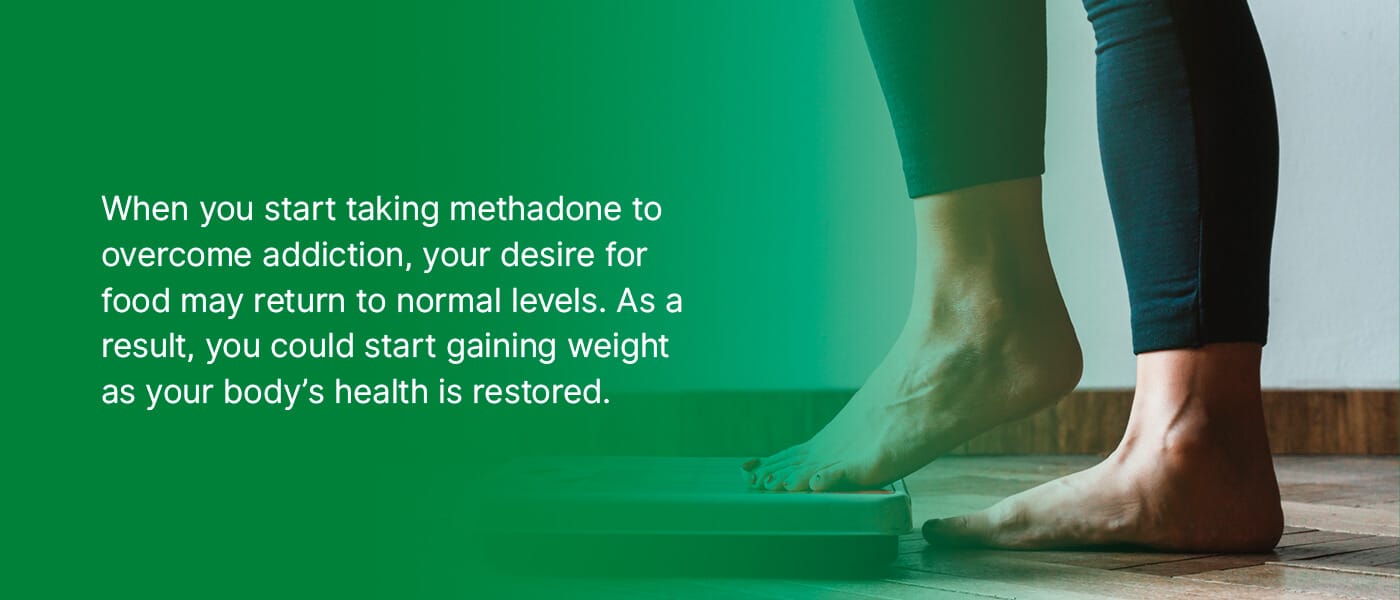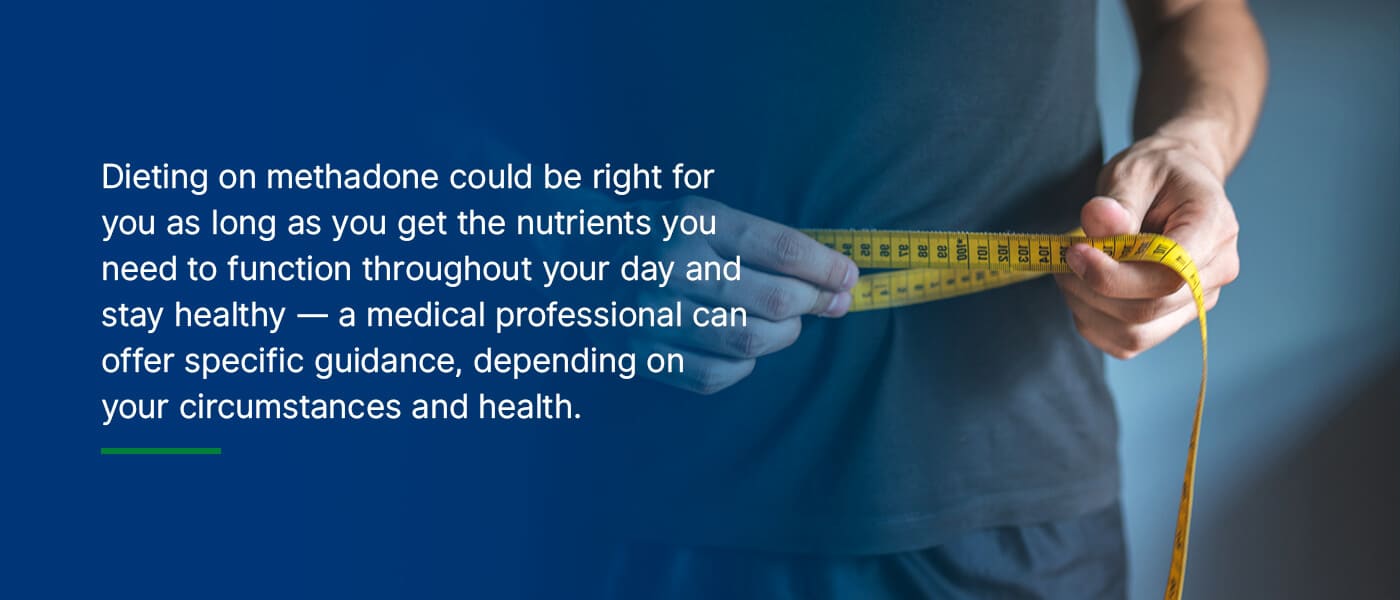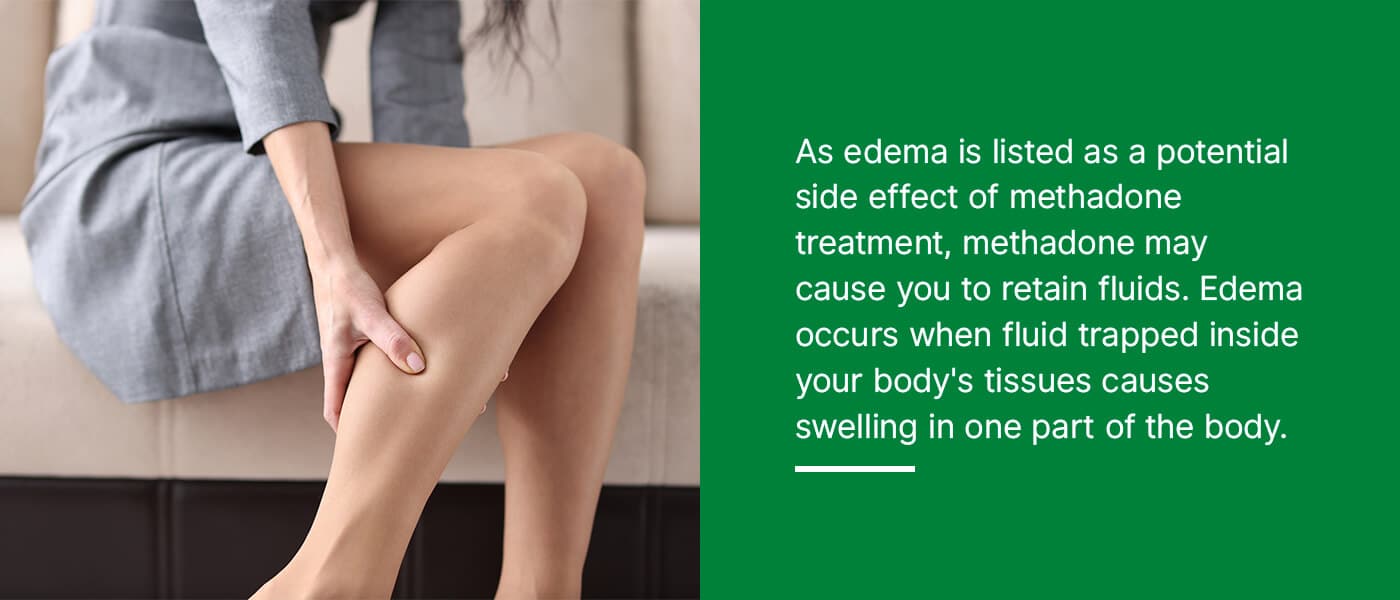The changes to your body during addiction and recovery can add new factors to consider when taking care of yourself. As you go through methadone treatment for opioid use disorder, you might experience weight gain. What causes this increase in weight? How can you maintain a healthy body mass index (BMI) during recovery? In this comprehensive guide, we will explore the answers to these questions and more.
Does Methadone Maintenance Treatment Cause Weight Gain?
Like any prescription medication, methadone can cause side effects during treatment, including weight gain. However, other factors may impact your weight throughout recovery as well, and you can take actions to help maintain a healthy weight.
As you transition from addiction to sobriety, your body may experience various changes that could lead to weight gain. Such weight gain can sometimes benefit your health, particularly if you have a low BMI. The National Institute of Health (NIH) defines 18.5 or below as a low BMI and anything 25 and over in the overweight BMI range. NIH also provides an online calculator to find out your BMI.
The ultimate goal is to maintain a healthy weight range, whether that involves losing weight, gaining weight or staying in your current range.

How Does Methadone and Addiction Recovery Impact Weight?
If you’ve experienced weight gain on methadone, it could be a side effect of the methadone itself or could signify some health improvements. Depending on your body weight before you started taking methadone for treating addiction, weight gain on methadone may indicate your body is returning to healthier weight levels.
Opioids impact sugar intake for people with opioid use disorder and those in methadone maintenance treatment. As a full-agonist opioid, methadone can have similar side effects to drugs in the same category. You can have a safe methadone treatment with a doctor’s help. Like other opioids, though, it can change how your body processes sugar. As a result, you may have more cravings for sweet food that causes weight gain.
The situational changes that come with the transition to recovery can also impact your weight. Some people with opioid use disorder have an underweight BMI because of opioids’ effect on their lives. Once they work on healthy habits, they begin to gain back the weight they lost during addiction. In some cases, the weight gain associated with methadone treatment can improve your health.
When you take drugs to experience altered moods or feelings — commonly referred to as a high — your brain perceives the feeling the drug triggers as a reward. Over time, it begins to associate that drug with a reward. Other things brains may perceive as rewards include food, sex and physical activity. Since drugs produce a stronger euphoric feeling, they can overpower the desire for food so that we do not eat enough. In this way, drug addiction can cause weight loss.
When you start taking methadone to overcome addiction, your desire for food may return to normal levels. As a result, you could start gaining weight as your body’s health is restored. The reward centers in your brain that were active during drug addiction may seek to fill the void with food as you persevere in sobriety and methadone treatment. You may find yourself overindulging in unhealthy foods as a coping mechanism when this happens.
It’s normal to resort to such coping mechanisms when treating addiction. However, finding coping mechanisms that contribute positively to your overall health is best.

Is It Hard to Lose Weight on Methadone? Can I Diet?
Since methadone affects your cravings, it presents different obstacles to losing weight on methadone. That said, those obstacles are not insurmountable. With discipline, support, and self-control, you can lose weight or maintain a healthy weight while taking methadone.
Dieting on methadone could be right for you as long as you get the nutrients you need to function throughout your day and stay healthy — a medical professional can offer specific guidance, depending on your circumstances and health.
Some weight gain can be beneficial, especially if drug addiction has reduced your body weight to unhealthy levels. The vital thing when dieting during methadone treatment is maintaining a healthy weight while eating well. Maintaining a healthy weight may involve gaining weight, losing weight, or eating a balanced diet that helps you maintain your current weight range. Whatever the case is for you, balance is essential.
What Can I Do to Maintain a Healthy Weight During Treatment?
If you start to gain weight during methadone maintenance, mention it to your doctor. Do not try to change your amount of methadone if you take it at home or stop going to your dosage appointments. Your provider can advise you on managing your weight throughout treatment and adjust your prescription.
Healthy Weight-Conscious Choices to Make While Taking Methadone
As you receive methadone, eating a healthy diet and regular exercise will help you maintain a healthy weight. These activities will also promote your overall wellness. Here are some ways exercise and a balanced diet can improve your overall health:
- Improved mood
- Greater mental clarity and focus
- Reduced risks of various diseases, such as heart disease, cancer, diabetes, arthritis, and other conditions
- Increased energy
- Strengthened bones
- Relief from some symptoms of depression and anxiety
- Better sleep

Does Methadone Cause You to Retain Fluids?
As edema is listed as a potential side effect of methadone treatment, methadone may cause you to retain fluids. Edema occurs when fluid trapped inside your body’s tissues causes swelling in one part of the body. Such fluid retention can cause increased weight gain. That said, many who take methadone as an addiction treatment will not experience edema.
How Can I Manage the Other Side Effects of Methadone?
Methadone can cause additional side effects you can manage with help from your doctor. These symptoms include:
- Nausea
- Sleep issues
- Mood changes
- Sweating
- Headache
Your clinic provider can work with you to find a treatment regimen that reduces these side effects. They will also advise you on lifestyle changes and strategies to handle these symptoms as you progress through recovery.
Medication-Assisted Treatment (MAT) at MedMark Treatment Centers
MedMark Treatment Centers assists patients across the United States by offering MAT programs with methadone and buprenorphine. We commit to providing treatment in a respectful and judgment-free environment. If you want to start the recovery process or transfer providers, let us accompany you on your journey. Visit our online contact form today to schedule an appointment, or call our office at 866-840-6658.
